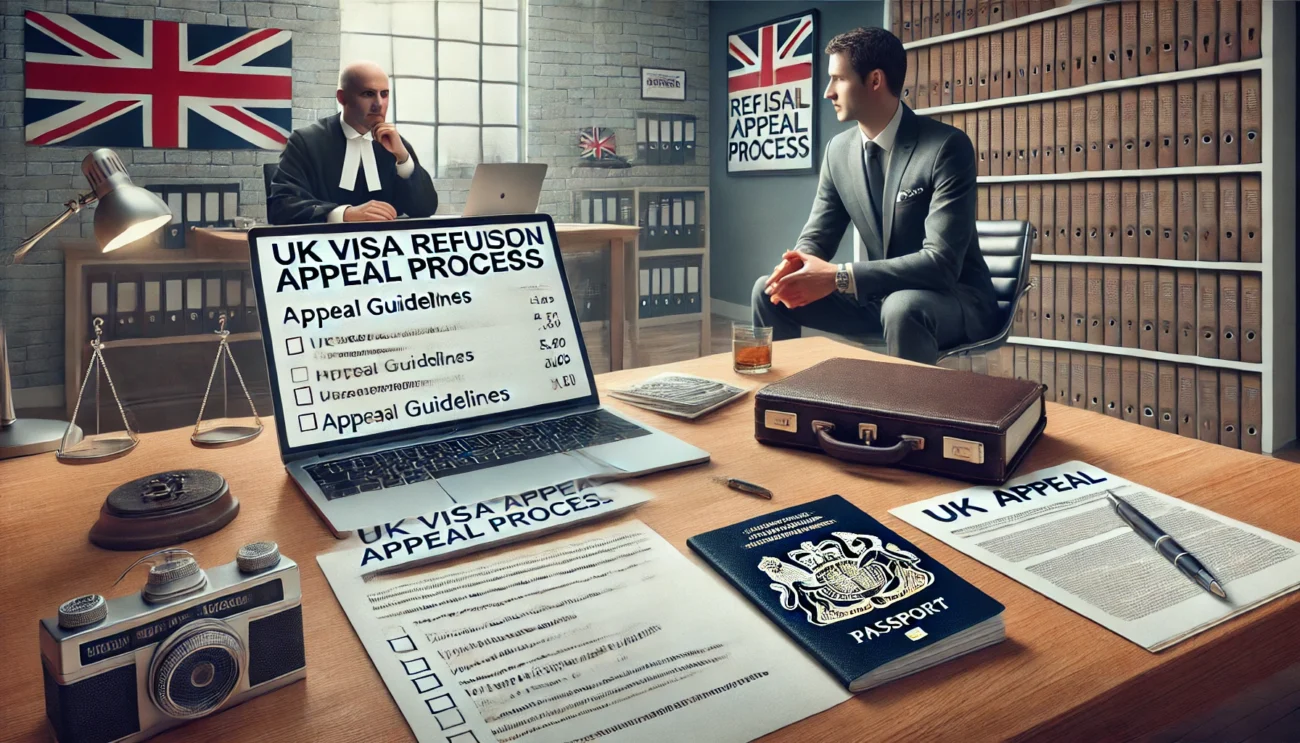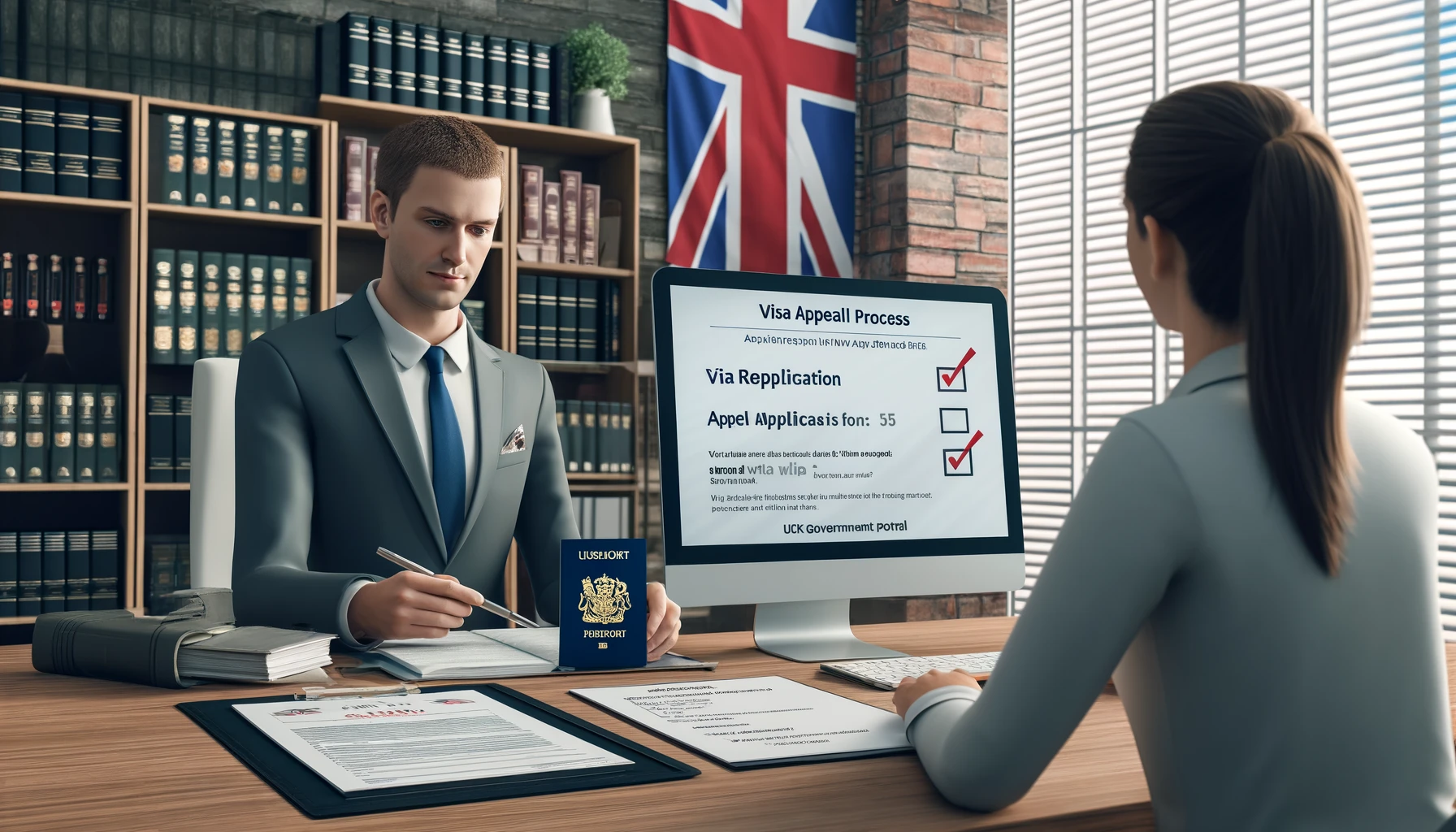Table of Contents
If your UK visa application has been refused, it can be a stressful and disheartening experience. However, it is not the end of the road. The UK Visa Refusal Appeal Process provides applicants with an opportunity to challenge the decision and potentially get their visa approved. Understanding this process is crucial to increasing your chances of success. In this guide, we’ll walk you through the steps involved in the UK Visa refusal appeal process, how to prepare for an appeal, the associated costs, and answer some common questions.
What Is a UK Visa Refusal Appeal?
A UK Visa Refusal Appeal Process is through which you can challenge a visa refusal decision made by the UK Home Office. If your application is refused, you can ask for a review of the decision. This process allows you to present new evidence or clarify any misunderstandings that may have led to the refusal.
It’s important to note that not all visa refusals are eligible for an appeal. In certain cases, the refusal may be final, and you may only have the option to submit a new application. However, if an appeal is permitted, it is your chance to rectify issues in your application and submit additional documents that can support your case.
Why Was My UK Visa Refused?
Before you initiate the UK Visa Refusal Appeal Process, it is essential to understand the reasons behind the rejection of your visa application. The refusal notice you receive will outline the specific causes for the refusal, and identifying these reasons will help you decide whether you are eligible to appeal and what evidence you need to submit in order to strengthen your case.
Insufficient Financial Evidence
One of the most common reasons for a UK visa refusal is insufficient financial evidence. The UK Home Office requires applicants to demonstrate that they have enough funds to cover both tuition fees and living expenses during their stay. If you failed to submit adequate bank statements, proof of income, or financial support letters, your application could be rejected. It’s crucial to provide updated and accurate financial documents to ensure that the authorities are convinced you can support yourself financially during your studies.
Incomplete or Incorrect Application Forms
Another frequent cause of visa refusal is incomplete or incorrect application forms. If you made errors on your application or omitted essential documents, this could lead to a rejection. Even small mistakes, such as missing signatures or incorrect details, can result in your application being rejected. To avoid this, double-check your forms to ensure all sections are completed accurately and that you have included the correct documents in the required format.
Lack of Evidence Supporting Your Purpose of Visit
A UK visa can also be refused if there is a lack of evidence to support your purpose of visit, such as your academic intentions or your ties to your home country. The Home Office wants to be sure that you are a genuine student who plans to return to your home country after your studies. If you fail to provide sufficient proof of your academic plans, such as a Confirmation of Acceptance for Studies (CAS), or evidence that you have strong connections to your home country, your visa application may be refused.
Failure to Demonstrate English Language Proficiency
Failure to demonstrate proficiency in English is another reason your visa application may be refused. Since English is the primary language of instruction in UK institutions, applicants must show that they meet the required language standards. This is typically done by submitting approved English test scores such as IELTS or TOEFL. If you did not submit proof of your English language proficiency or if you failed to meet the required scores, your visa may be rejected.
Reviewing Your Refusal Notice
The refusal notice you receive will provide a detailed explanation of the reasons for your visa rejection. Understanding these reasons will help you assess whether you are eligible to appeal and will guide you in gathering the necessary evidence to support your appeal. If you are unsure about the reasons for the refusal, it’s important to seek professional advice to ensure that you address the issues appropriately.
Steps in the UK Visa Refusal Appeal Process
If you have received a refusal notice and want to appeal, follow these steps to ensure a smooth and successful process:
Step 1: Understand the Refusal Notice
The first step is to carefully read the refusal notice. It will contain important details, such as the reasons for the refusal and whether you are eligible to appeal. If the refusal is based on a simple error or misunderstanding, you may be able to resolve the issue by submitting additional documents.
Step 2: Decide Whether to Appeal
Not all refusals are eligible for an appeal. In some cases, you may be given the option to submit additional evidence instead of a formal appeal. If your refusal does allow for an appeal, it is essential to decide whether challenging the decision is the best option for you.
Step 3: Submit Your Appeal
If you decide to appeal, you will need to submit an appeal form to the UK Immigration Tribunal. This form will ask for details of your case, the grounds for your appeal, and any supporting evidence you want to include. You may also need to pay an appeal fee, which typically ranges from £140 to £350, depending on the type of appeal.
Step 4: Prepare Supporting Documents
Along with your appeal form, it’s crucial to submit any additional documents or evidence that support your case. This could include updated financial documents, proof of accommodation, or more detailed explanations of your travel plans. The more evidence you provide, the stronger your appeal will be.
Step 5: Wait for a Decision
Once your appeal is submitted, the Home Office will review your case and make a decision. This process may take several weeks or even months, depending on the complexity of the case and the volume of appeals being processed. It is important to be patient during this period and avoid making any other visa applications until your appeal is resolved.
How Much Does the UK Visa Refusal Appeal Process Cost?
The cost of a UK Visa refusal appeal can vary depending on the type of visa and the complexity of your case. Generally, the fee for submitting an appeal is between £140 and £350. The fee is non-refundable, even if your appeal is unsuccessful. It’s also important to note that if your appeal is successful, the Home Office may refund some of the costs associated with the appeal.
In addition to the appeal fee, you may incur other costs, such as the fee for submitting new evidence or for professional assistance, like hiring an immigration lawyer or advisor.

Strategies to Increase Your Chances of a Successful UK Visa Refusal Appeal
While there is no guaranteed way to ensure that your UK visa refusal appeal will be successful, several strategies can help strengthen your case. The appeal process can be complex, but taking the right steps can significantly improve your chances of getting your visa approved. Below are some key strategies to consider when preparing your appeal:
Provide Additional Evidence:
One of the most effective ways to strengthen your appeal is by providing additional evidence. Submit updated financial statements that show you have the required funds to cover your tuition fees and living expenses. If your initial application was missing documents like bank statements or sponsor letters, it’s important to include these in your appeal.
Additionally, if the refusal was based on a failure to meet the required English proficiency level, submit updated test scores or other relevant evidence of your language skills. The more relevant evidence you can provide, the stronger your case will be. Make sure all documents are recent and meet the UK Home Office’s standards.
Clarify Any Misunderstandings or Errors:
Another strategy is to address any misunderstandings or errors that may have led to the refusal. If your financial documents were misinterpreted or there were errors in your application form, provide a clear explanation. This could involve clarifying discrepancies or offering additional context that may have been overlooked in the initial review.
For example, if your bank statements were unclear or lacked detail, include a more thorough explanation or updated versions. A well-written, concise explanation can help the Home Office better understand your situation and correct any errors that may have led to the refusal.
Consult an Expert
If you’re uncertain about how to proceed with your appeal, seeking professional advice from an immigration expert or solicitor can be extremely beneficial. These professionals are knowledgeable about the immigration laws and regulations that govern the UK visa process.
They can help you prepare your appeal, guide you in gathering the necessary documents, and ensure that your submission meets all the legal requirements. By consulting an expert, you’ll have someone with experience to support you through the process and help you address any challenges along the way.
Follow the Correct Appeal Process
It’s also essential to follow the correct appeal process to ensure that your case is considered. Make sure you submit your appeal within the specified timeframe outlined in the refusal notice. Missing deadlines or failing to provide the necessary documentation could result in your appeal being rejected.
Stay organized throughout the process and make sure to carefully review all the guidelines provided by the UK Home Office. By adhering to the correct procedure, you can avoid unnecessary delays or complications during your appeal.
By providing additional evidence, clarifying any mistakes, and seeking professional help, you can improve your chances of success in the UK Visa refusal appeal process. While there is no guarantee, these steps will help you create a stronger case and give you the best opportunity to overturn the refusal.
Frequently Asked Questions (FAQs)
1. Can I appeal a UK visa refusal?
You can appeal a UK visa refusal if your refusal notice indicates that you are eligible for an appeal. However, not all refusals are eligible for an appeal, so be sure to check the details provided in the notice.
2. How long does the UK visa refusal appeal process take?
The processing time for a UK visa refusal appeal can vary, but typically it takes between 6 to 12 weeks. Some complex cases may take longer.
3. What happens if my UK visa refusal appeal is successful?
If your appeal is successful, your visa will be approved, and you will receive a visa that allows you to travel to the UK. In some cases, the Home Office may refund part of the appeal fee.
4. What if my UK visa refusal appeal is unsuccessful?
If your appeal is unsuccessful, you may need to submit a new application with corrected documents or consider other visa options.
5. Can I apply for a new UK visa while my appeal is pending?
It is not recommended to apply for a new visa while your appeal is ongoing, as this could lead to confusion or complications with your case.
Conclusion
The UK Visa refusal appeal process can seem daunting, but with careful planning and the right guidance, you can increase your chances of a successful outcome. It’s important to understand the reasons for your visa refusal, decide whether to appeal, and provide all necessary supporting documents. The process may take time, but it offers a valuable opportunity to challenge a refusal and potentially obtain your UK visa.
If you need assistance with your UK Visa refusal appeal or any part of the application process, our team is here to help. Contact us today for expert advice and support.

